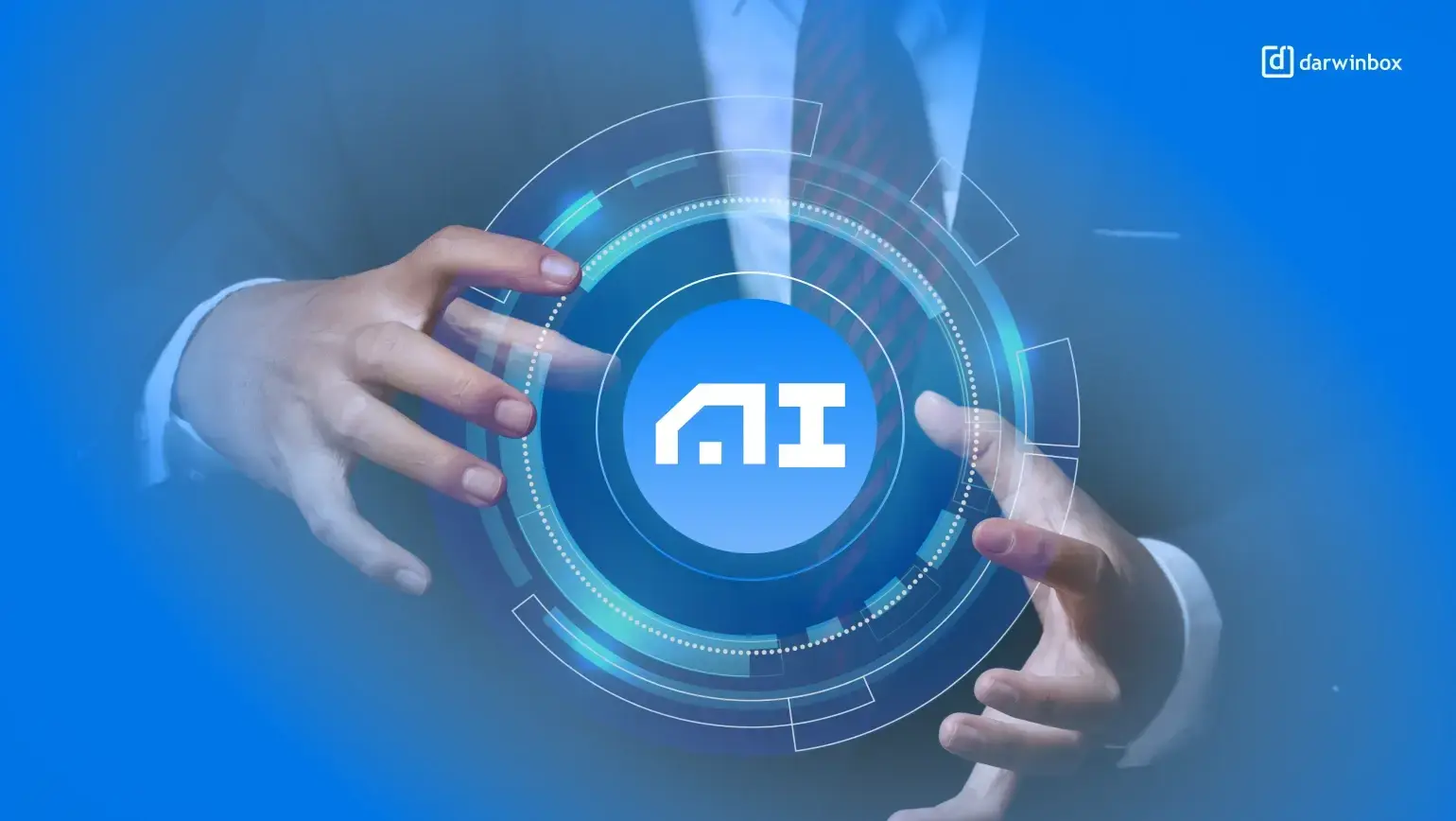

In my recent conversations with CIOs, one theme resonates consistently - the AI wave is no longer a distant prospect but an immediate priority. Keeping up with the relentless speed of AI advancements can be both exciting and daunting. Almost every organization I talk to is eager to understand what Darwinbox is doing around AI and how it could impact them. A growing sense of opportunity and ambition is motivating organizations to embrace the AI wave, driven by the urgency to gain a competitive edge, streamline operations, and enhance employee experiences.
A recent Gartner survey revealed that 76% of HR leaders believe they risk falling behind in organizational success if they don’t adopt Gen AI within the next 12 to 24 months. This urgency has created a race to adopt AI-driven technologies and deliver measurable outcomes swiftly. CIOs, as the stewards of technology, are at the forefront of this transformation. They face the immense responsibility of implementing AI solutions securely, at scale, and with tangible business impact.
In working alongside IT leaders, I’ve gained an appreciation for the balance CIOs need to strike between the excitement of adopting AI with the responsibility of ensuring secure and scalable implementations. It’s a role that demands strategic vision and operational diligence. Yet, with great opportunity comes significant responsibility. So, how should CIOs approach AI transformation?
Tackle The Threshold Challenge: Which Solutions Should You Choose?
Based on the business mandate, CIOs analyse and contemplate where they can implement AI and then turn to the market looking for solutions. The market is flooded with technologies and every other vendor claims to have embedded AI to some or full extent. But how do you differentiate genuine AI solutions from overhyped offerings in a crowded marketplace? CIOs must approach AI initiatives with a critical eye, asking:
- Does this technology align with our organizational goals?
- Does this technology serve multiple use cases and unlock a pace of innovation?
- Is there proven value in these use cases?
- Is the platform scalable – can it handle large volumes of data, including custom data, and can it ingest business data?
AI-Ready Data: The Pillar for Effective AI Transformation
As organizations embrace AI, one foundational aspect must not be overlooked: AI-ready data. In my experience, ensuring AI-ready data is about having clean data and building a flexible architecture that can adapt to evolving business needs. This approach has proven invaluable in my interactions with leading CIOs. Without the right data infrastructure, even the most advanced AI solutions will underperform.
AI adoption depends on the quality of the data it’s trained on. CIOs must prioritize building robust data architectures by consolidating and standardizing data from various sources. AI-ready data is crucial for the effective deployment of AI, enabling systems to learn, adapt, and generate insights that drive key business decisions—whether in HR, customer experience, sales, or any other function.
Let’s take an example of how an HRIS with HR-centric LLM can make a difference. An HRIS pre-trained on HR-centric data is positioned to transform HR functions. These systems understand the nuances of resumes, performance reviews, employee policies, and skills, ensuring accuracy and contextual relevance. In an AI landscape prone to hallucinations, this focus on HR-specific data minimizes errors and improves outcomes.
Implementing AI Securely and Ethically
AI adoption comes with risks, from data breaches to ethical dilemmas. Enterprise-grade AI deployments are intricate and high-stakes endeavors. They require platforms that are worthy of your trust. CIOs must prioritize governance frameworks that address:
- Data security: Implement strong encryption and role-based access controls.
- Bias mitigation: Regularly audit AI models to identify and address biases, particularly in people-centric systems like HRIS.
- Compliance: Ensure solutions comply with global data privacy laws such as GDPR and CCPA.
CIOs must stay ahead by adopting best practices for secure AI development and usage, such as controlled access to Gen-AI tools and frequent security reviews. In my discussions with these champions of innovations, I emphasize the importance of transparency in AI deployments. One approach I recommend is demanding clear vendor disclosures on model training and validation to mitigate risks effectively. They can also opt for technologies that focus heavily on responsible AI.
Deriving Value and Scaling AI
The journey of AI adoption within enterprises begins with a fundamental question: how can organizations unlock AI’s potential to create meaningful, scalable impact? The answer lies in strategically integrating AI into processes that maximize value while aligning with the organization’s overall objectives.
The true power of AI lies in its ability to scale across an organization, delivering value at every level. To achieve this, CIOs should:
- Start small, scale fast: Begin with targeted AI pilots in high-impact areas to demonstrate quick wins, build stakeholder confidence, and gather insights for broader rollouts
- Focus on integration: Ensure AI tools seamlessly integrate with existing systems, whether it's your project management software, CRM, or any finance applications, to ensure smooth data flows, eliminate silos, and drive cohesive operational outcomes.
- Measure impact: Track KPIs such as productivity, employee satisfaction, and cost savings to gauge AI’s effectiveness and derive tangible results. Cost savings can help build a strong case for further investment and fuel the expansion of digital transformation initiatives.
Building an AI-First Culture
Creating an AI-first culture starts with CIOs fostering trust and transparency. I’ve often seen that engaging employees early and addressing their concerns head-on leads to smoother adoption. To truly harness AI's potential, organizations must create an environment where AI is embraced and integrated into the fabric of their daily operations. This also involves rethinking traditional workflows and ensuring cross-functional collaboration. A robust AI-first culture paves the way for sustainable innovation, enabling employees to leverage AI’s strengths while focusing on strategic, value-driven tasks.
- Empower teams: Collaborate with HR and invest in upskilling employees to work alongside AI tools. HR departments, for instance, can be trained to leverage AI-driven insights to understand employee sentiments to predict attrition. Managers can be trained to tools to write comprehensive performance reviews with the help of AI.
- Drive trust: Communicate clearly about how AI is used, its benefits, and the safeguards in place to prevent misuse. Building trust with employees is crucial to ensuring AI adoption is successful. Engage employees early in the process, explaining how AI will augment their roles.
This is particularly critical in HR applications, where AI decisions —such as those related to hiring, performance reviews, or career development can have a direct and lasting impact on employees' professional lives.
- Champion collaboration: Bridge the gap between IT and business units, ensuring AI solutions align with organizational needs and are widely embraced.
Is HR Tech a Prime Use Case of AI-led Transformation?
Yes. Modern HR platforms equipped with AI capabilities provide a powerful blueprint for transforming workflows, streamlining operations, and driving organizational impact. For instance, Darwinbox Sense, seamlessly integrated into the Darwinbox platform, delivers tangible value across the employee lifecycle. Its practical application enhances critical HR functions by embedding AI-driven insights into everyday tasks—from gauging employee sentiment in performance reviews to identifying and mitigating bias in hiring. This enables organizations to make thoughtful, data-backed decisions that foster inclusivity and engagement.
In addition, Darwinbox offers advanced features such as Flow-Assist for AI-driven workflow creation, Gen AI-powered smart search and analytics, and Amplify Assistant for efficient script creation, testing, and deployment. These capabilities empower businesses to optimize operations and drive data-informed decisions, maximizing the potential of AI across the enterprise.
Join the Conversation: Empowering CIOs to Lead AI-Driven Transformation
As we navigate the transformative wave of AI, the role of CIOs extends far beyond implementing cutting-edge technology. It’s about aligning innovation with organizational goals, fostering trust and transparency, and ensuring these tools empower the people who drive your business forward.
At Darwinbox, we are committed to partnering with forward-thinking CIOs to drive impactful digital transformation. Let’s continue this conversation—how are you leveraging AI to create meaningful change in your organization? Share your thoughts or reach out to explore actionable strategies tailored to your journey: Get in touch.


Speak Your Mind